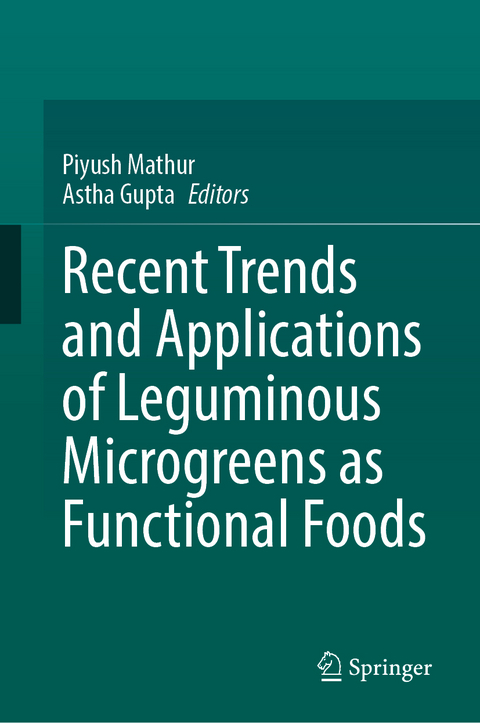
Recent Trends and Applications of Leguminous Microgreens as Functional Foods
Springer International Publishing (Verlag)
978-3-031-75677-1 (ISBN)
- Noch nicht erschienen - erscheint am 10.02.2025
- Versandkostenfrei
- Auch auf Rechnung
- Artikel merken
Microgreens are the name given to the small, soft, green parts of plants that develop from seedlings and do not bear any real leaves. These microgreens are known to have high nutritional content and are composed of phytoconstituents such as carotenes, phenolics and polysterols which allow for their usage in dietary programs. Legumes provide high nutritional value by enhancing dietary fibre, vitamins and minerals, and are one of the most important sources of plant protein in the human diet. Leguminous microgreens can play a significant role in fulfilling the nutritional requirement of world's population and will assist in completing the United Nations' global goal of 'zero hunger' (Sustainable Development Goal 2).
Recent Trends and Applications of Leguminous Microgreens as Functional Foods provides an in-depth look at the development of leguminous microgreens, such as chickpea, lentils, beans and peas. It covers potential germplasm containing high iron and zinc levels; biomass and nutritive traits that can be used to produce a bio-fortified functional food with appropriate proportions of nutritive components. The book also discusses the increasing interest in production and consumption of microgreens due to their nutritional content, yield rate, rapid production time frame and aroma qualities among other factors. The book also covers management methods for production of biofortified food through conventional, molecular and biotechnological approaches such as hydroponics and aquaponics systems. Additionally, it contains assessments on safety during storage as well information on how to develop value-added products that can supplement food needs/requirements. This book is a valuable tool for anyone looking to gain a comprehensive understanding of this growing sector within agriculture and will provide readers with all they need to know about developing leguminous microgreens for enriched functional foods.
Dr. Piyush Mathur is an Assistant Professor in the Department of Botany at the Banaras Hindu University, Varanasi, Uttar Pradesh, India.
Dr. Astha Gupta is an Assistant Professor in the Department of Biotechnology at Sharda School of Engineering and Technology, Sharda University in Greater Noida, Uttar Pradesh, India.
Nutritional Profile of Leguminous Microgreens: Seed to Superfood.- Leguminous Microgreens and the Makeup of their Nutrients.- Trailing the Prospects of Leguminous Microgreens as Rising Functional and Future Foods.- Leguminous Microgreens And Their Nutritional Composition.- Nutritionally superior microgreens: An emerging living functional food.- Leguminous Microgreens as a Sustainable Source of Essential Nutrients.- Updates on Bioactive Compound of Microgreens: A Novel Superfood for Monitoring Lifestyle Disease.- Vigna radiata: A Minor Legume with Major Potential.- Approaches to Enhance Abiotic and Biotic Stress Tolerance in Leguminous Crops and Microgreens.- Management of Disease Losses in Leguminous Microgreens.- Innovations in Leguminous Microgreens: Recent Trends and Applications.- Advancing Cultivation Substrates and Methods to Elevate Nutritional Quality and Production of Leguminous Microgreens.- Role of Mycorrhizal Association in Leguminous Plant Growth.- Microbial Consortia Unleashed: A New Era in Sustainable Microgreen Cultivation.- Bio-stimulating Role of Plant Growth Promoting Microorganisms in the Sustainable Production of Micro greens.- Recent Advancements in Plant Growth Promoting Rhizobacteria (PGPR) Induced Seed Germination and Seedling Growth and its Implementation in Soil-Less Leguminous Microgreen Farming.- Genetic Enhancement of Leguminous Microgreens: A Frontier in Sustainable Nutrition.- Genetic engineering: A potential tool in enhancing the quality and shelf life of leguminous microgreens.- Genetic Engineering and Genome Editing for Enhancing Nutritional Quality of Legumes.- Potential application of nanotechnology, hydroponics, and genetic engineering in enhancing leguminous microgreens' quality and shelf life.- Nanotechnological Innovations in Soilless Microgreen Farming for Sustainable Agriculture.- Potential Effects of Nanotechnology for the Enhancement of Leguminous Microgreens Quality, Productivity and Sustainability.- Engineered Nanoparticles for the Betterment of Legume Microgreens: A Detailed Overview.- Exploring the Role of Leguminous Microgreens in Obesity Management with potential Mechanisms and Clinical Evidence.- Tailoring the Biomass, Nutritional Value, Shelf Life and Food Use of Microgreens.- Microgreens as Budding Medicine and Bountiful Source of Nutrition.- Phytochemical and Nutritional Properties of Leguminous Microgreens and its Application in Food Industry.
| Erscheint lt. Verlag | 10.2.2025 |
|---|---|
| Zusatzinfo | Approx. 400 p. |
| Verlagsort | Cham |
| Sprache | englisch |
| Maße | 155 x 235 mm |
| Themenwelt | Naturwissenschaften ► Biologie ► Botanik |
| Naturwissenschaften ► Chemie ► Technische Chemie | |
| Technik ► Lebensmitteltechnologie | |
| Schlagworte | Biofortified foods • food security • Functional Foods • Legumes • Microgreens • Zero hunger |
| ISBN-10 | 3-031-75677-0 / 3031756770 |
| ISBN-13 | 978-3-031-75677-1 / 9783031756771 |
| Zustand | Neuware |
| Haben Sie eine Frage zum Produkt? |
aus dem Bereich


